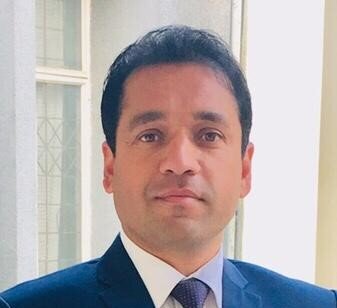By Mohammad Mazhari
TEHRAN – A member of an Islamabad-based think tank believes that the “Taliban are accommodating all ethnic groups” as it looks forward to seize the power in Kabul.
“Taliban are accommodating all the ethnic groups in their organization as they have eyes on the upcoming administration in Kabul,” Zafar Iqbal Yousafzai, a senior research associate at Strategic Vision Institute (SVI), tells the Tehran Times.
“Last year, the Taliban appointed a Shia Taliban commander in one of the districts that showed they are accommodating all the ethnic and religious groups,” Yousafzai adds.
The Taliban are advancing at lightning speed across Afghanistan as U.S. troops withdraw. They now control a third of the country, are fighting for control of 42 percent more — and may even be slowing their advance on purpose.
According to Afghan media reports, eyewitness accounts and statements from local Afghan officials, the Taliban are advancing in rural areas and near Kabul. They now hold almost twice as much of Afghanistan as they did just two months ago, raising fresh doubts about whether the Afghan government can survive once U.S. forces depart by Sept. 11.
Following is the text of the interview with Zafar Iqbal Yousafzai:
Q: How do you see repercussions of U.S. withdrawal from Afghanistan? What does it mean for the world and the American public after two decades of war?
A: The U.S. withdrawal was due since long as the Taliban and the regional countries do not want the U.S. long presence in Afghanistan to be a threat to them. The repercussions of the withdrawal will depend on the U.S. role in the intra-Afghan talks where Washington needs to pressurize Kabul to make any compromise as the U.S. did in Doha deal with the Taliban last year. The Afghan government has no way but to make a compromise but they are just taking time and prolonging their rule to the maximum possible time. The recent Ghani administration visit and the report suggest Biden want Kabul to make a deal with the Taliban to end this conflict. However, if the U.S. does not pressurize Kabul and the U.S. either further prolongs its presence, it will provide for an intensified conflict for which the Taliban seems ready.
Q: How do you assess Pakistan’s stance towards the U.S. presence in Afghanistan?
A: Pakistan in post-September 11 period provided the U.S. with bases and another sort of support due to the changing international arena otherwise Pakistan did not want to withdraw its support to the Taliban. However, Pakistan had no choice but to support the U.S. in its war on terror. The current circumstances are quite different from that of 2001 where Pakistan’s position is strong vis-à-vis the Afghan conflict while Washington is in a weak position. Similarly, Pakistan cannot afford enmity with the Taliban by providing bases to the U.S. The Taliban has strongly warned any neighboring country for providing bases to the U.S. for operations in Afghanistan. Imran Khan in an interview clearly said Pakistan will not provide bases to the U.S. If Washington further pressurizes Pakistan for the same, it could affect Pakistan’s support in the Afghan peace process that is still going on. Washington knows well that the path to peace in Afghanistan goes through Pakistan.
Q: Some Afghan groups, including Hazaras, are preparing to confront the Taliban. Do you predict an exacerbation of clashes between Afghan groups?
A: There are reports for months various groups are arming their militias against the Taliban. However, that could not challenge the Taliban in a way that could create serious problems for the Taliban. Likewise, the Afghan government and NDS are arranging fake ceremonies where they gather people and weapons and show them as a surrender of the Taliban. They assume it will boost the morale of the Afghan forces yet it’s not going to work. Taliban are accommodating all the ethnic groups in their organization as they have eyes on the upcoming administration in Kabul. Last year, the Taliban appointed a Shia Taliban commander in one of the districts that showed they are accommodating all the ethnic and religious groups.
Q: How can Iran and Pakistan collaborate to establish peace in Afghanistan? Is there any possibility for a new peace initiative?
A: In the past, there was a divergence between Pakistan and Iran over Afghanistan due to Pakistan’s support of the Taliban and Iran’s support to the opposite groups. Since the Taliban killed a dozen of Iranian diplomats in Mazar Sharif in 1996, it created a huge trust deficit and divergence between the Taliban and Tehran. However, at the moment, there is close contact between the Taliban and Tehran which has abridged the Islamabad-Iran gap that was there due to the Taliban. Being neighbors, both Iran and Pakistan have to play a crucial role in Afghan peace.
Q: Former Afghan President Hamid Karzai has harshly criticized U.S. war tactics in Afghanistan over the past twenty years. What is the Afghan people’s view of the U.S. performance?
A: When Karzai became interim president, he wanted the Taliban to be merged and accommodated in the new setup which was strongly opposed by the U.S. authorities. Karzai made many attempts and made it clear to the U.S. to negotiate with the Taliban yet Washington always dismissed the idea. There is a mixed view of the U.S. role in the Afghan populace. However, many consider them invaders that’s why the Taliban insurgency was supported by the masses, otherwise, the Taliban insurgency would not succeed. What we see on Afghan mainstem media is only elites view sitting in Kabul who want the U.S. presence in Afghanistan while the ground reality is different. The U.S. did its best what it could do against the Taliban and Al-Qaeda in Afghanistan. Now it’s time for them to get out of Afghanistan as soon as possible and provide an opportunity to the Afghans and facilitate them to agree on a settlement to resolve the Afghan quagmire.
TAGS


No comments:
Post a Comment